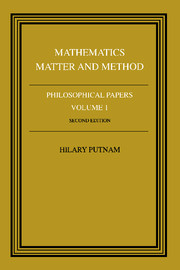Book contents
- Frontmatter
- Contents
- Dedication
- Introduction
- 1 Truth and necessity in mathematics
- 2 The thesis that mathematics is logic
- 3 Mathematics without foundations
- 4 What is mathematical truth?
- 5 Philosophy of physics
- 6 An examination of Grünbaum's philosophy of geometry
- 7 A philosopher looks at quantum mechanics
- 8 Discussion: comments on comments on comments: a reply to Margenau and Wigner
- 9 Three-valued logic
- 10 The logic of quantum mechanics
- 11 Time and physical geometry
- 12 Memo on ‘conventionalism’
- 13 What theories are not
- 14 Craig's theorem
- 15 It ain't necessarily so
- 16 The ‘corroboration’ of theories
- 17 ‘Degree of confirmation’ and inductive logic
- 18 Probability and confirmation
- 19 On properties
- 20 Philosophy of Logic
- Bibliography
- Index
- Frontmatter
- Contents
- Dedication
- Introduction
- 1 Truth and necessity in mathematics
- 2 The thesis that mathematics is logic
- 3 Mathematics without foundations
- 4 What is mathematical truth?
- 5 Philosophy of physics
- 6 An examination of Grünbaum's philosophy of geometry
- 7 A philosopher looks at quantum mechanics
- 8 Discussion: comments on comments on comments: a reply to Margenau and Wigner
- 9 Three-valued logic
- 10 The logic of quantum mechanics
- 11 Time and physical geometry
- 12 Memo on ‘conventionalism’
- 13 What theories are not
- 14 Craig's theorem
- 15 It ain't necessarily so
- 16 The ‘corroboration’ of theories
- 17 ‘Degree of confirmation’ and inductive logic
- 18 Probability and confirmation
- 19 On properties
- 20 Philosophy of Logic
- Bibliography
- Index
Summary
It has been maintained by such philosophers as Quine and Goodman that purely ‘extensional’ language suffices for all the purposes of properly formalized scientific discourse. Those entities that were traditionally called ‘universals’ – properties, concepts, forms, etc. – are rejected by these extensionalist philosophers on the ground that ‘the principle of individuation is not clear’. It is conceded that science requires that we allow something tantamount to quantification over non-particulars (or, anyway, over things that are not material objects, not space-time points, not physical fields, etc.), but, the extensionalists contend, quantification over sets serves the purposes nicely. The ‘ontology’ of modern science, at least as Quine formalizes it, comprises material objects (or, alternatively, space-time points), sets of material objects, sets of sets of material objects, …, but no properties, concepts; or forms. Let us thus examine the question: can the principle of individuation for properties ever be made clear?
Properties and reduction
It seems to me that there are at least two notions of ‘property’ that have become confused in our minds. There is a very old notion for which the word ‘predicate’ used to be employed (using ‘predicate’ as a term only for expressions and never for properties is a relatively recent mode of speech: ‘Is existence a predicate?’ was not a syntactical question) and there is the notion for which I shall use the terms ‘physical property’, ‘physical magnitude’, ‘physical relation’, etc., depending on whether the object in question is one-place, a functor, more than one-place, etc.
Information
- Type
- Chapter
- Information
- Mathematics, Matter and MethodPhilosophical Papers, pp. 305 - 322Publisher: Cambridge University PressPrint publication year: 1979
Accessibility standard: Unknown
Why this information is here
This section outlines the accessibility features of this content - including support for screen readers, full keyboard navigation and high-contrast display options. This may not be relevant for you.Accessibility Information
- 3
- Cited by
